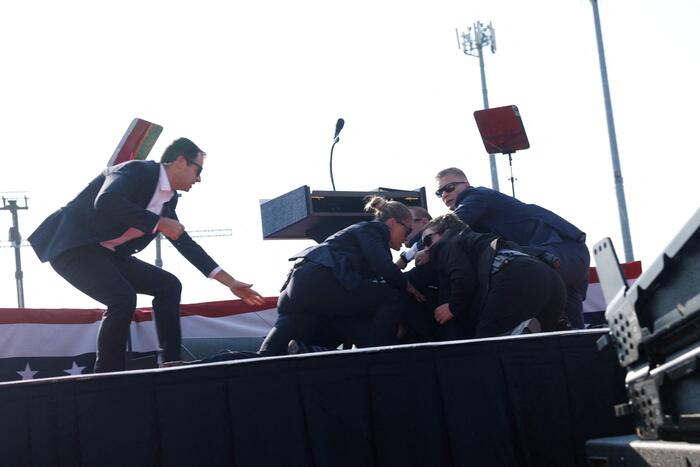Following the near-miss that narrowly spared Donald Trump’s head during his rally in Butler, PA last Saturday, the crosshairs have now seemingly focused on the entire Secret Service. Many have started to wonder why operatives who are well trained to intervene in the event of a shooting in fact failed to flush out 20-year-old Thomas Matthew Crooks, preventing the suspect from lurking on a rooftop that gave him an optimal view of the stage. Among them are the FBI, the Department of Homeland Security and the Secret Service itself, which launched a formal investigation to expose what went wrong.
In broad daylight, Crooks managed to position himself on a side roof while slinging an AR-15 semi-automatic rifle, from where he reportedly fired four shots toward the stage. One bystander, later identified as firefighter Corey Comperatore, was killed and two others were seriously wounded before the shooter was “neutralized” by security team goons. The likely target of the ambush, that is Trump, was only narrowly wounded in the ear, managing to avoid more serious consequences by bending down at the first sound of gunfire (despite continuing to wave to the crowd before being led away).
FBI investigations indicate that Crooks acted alone, although the feds have not completely ruled out the existence of possible conspirators in what has been officially categorized as a case of “domestic terrorism.”
Former classmates of the suspect told local media that Crooks was often regarded as an “outcast,” and peers would sometimes bully him. Others told ABC News that he had been rejected from the high school shooting team since he was a “bad shooter.”
But how did Crooks lurk undisturbed in an area that theoretically should have been off-limits? Some eyewitnesses reported seeing the killer prowling the rooftop for several minutes before opening fire. One of them, who identified himself as Greg, said their early reports to police were not taken seriously, adding that officers could have had poor visibility of where the bullets were coming from.
Was it a matter of incompetence or fatality? Charles Marino, a former Secret Service agent, pointed out that the practice in such cases is always to survey the surroundings and identify suspicious areas. Evy Poumpouras, another former agent, admitted that it is often difficult to ensure absolute security at such crowded events, where the perimeter to be cleared is far too large.
Providing some more clarification may be Service Director Kimberly Cheatle, who has been summoned to testify before a House of Representatives committee on July 22. Cheatle praised the agents’ promptness in neutralizing the gunman and protecting the former president, while not going into the possible flaws that allowed Crooks to pull the trigger in the first place.
In an address to the nation on Sunday, President Joe Biden said he had instructed Cheatle to review all security measures for the Republican National Convention, which began Monday in Milwaukee – which the New York tycoon confirmed he would attend “so as not to give it away to a killer.”
“The Secret Service is working with all involved Federal, state and local agencies to understand what happened, how it happened, and how we can prevent an incident like this from ever taking place again,” Cheatle said Monday in a statement. “We will also work with the appropriate congressional committees for any oversight action,” he added.
The incident triggered a wave of strong reactions among the former president’s supporters. Visible dismay over security lapses was expressed by both House Oversight Committee Chairman James Comer and House Homeland Security Committee Chairman Mark Green. House Speaker Mike Johnson also said in a post on X that the House will “conduct a full investigation” into the shooting.
On Saturday, Republican Congressman Mike Waltz accused Homeland Security Secretary Alejandro Mayorkas of rejecting repeated GOP calls to increase protection at Trump events. However, accusations were firmly denied by the Secret Service.
“This is absolutely false. In fact, we added protective resources and technology and capabilities as part of the increased campaign travel tempo,” Secret Service spokesperson Anthony Guglielmi wrote on X on Sunday.
Shedding light on alleged leaks and omissions could take months, if not years. In the immediate term, there remains a need to ensure the security of Mr. Trump and the other two White House hopefuls, namely President Biden and independent candidate Robert F. Kennedy Jr. A bipartisan bill introduced in the hours immediately following the attack by Congressmen Mike Lawler (Republican) and Ritchie Torres (Democrat) therefore plans to tighten security protocols for the three presidential contenders.












